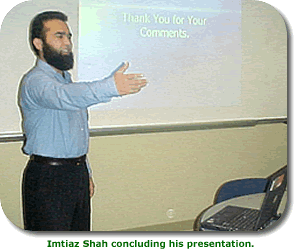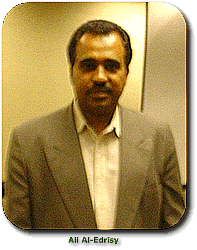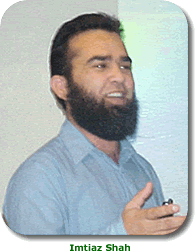On October 10, 2003, Imtiaz Shah successfully defended his doctoral dissertation research on the topic of “A Descriptive Environmental Impact Assessment Process Model for Pakistan.”
Imtiaz, formerly an Assistant Professor at the Engineering University, Peshawar, Pakistan, previously obtained his Master of Civil and Environmental Engineering at GW. He has seven years of professional experience in the area of water resources engineering, including work at Dewberry and Davis, Fairfax, Virginia and Greenhorn & O’Mara, Inc. Maryland. Imtiaz also taught several courses at the Department of Civil and Environmental Engineering Department at GW.

In undertaking his doctoral research, Imtiaz found that, in the past few years, several South Asian countries, including Pakistan, have begun implementing Environmental Impact Assessment (EIA) as an environmental management tool. However, because of public participation, operational, institutional, and structural differences among these countries, applications and outcomes of the EIA process have reflected great disparities among them. While some of these differences can be attributed to individualized procedures that have been developed to accommodate the realities of each country, the wide diversity of methodologies in environmental analysis, and systematic process differences that exist in these countries reflect a considerable degree of sub-optimal practices.
Imtiaz’s research was focused on identifying procedural improvements in the EIA process in the Pakistan. Such improvements have the potential for significant positive impacts on the quality of life and prospects for sustainable development in Pakistan.
Imtiaz’s research identified, analyzed, and evaluated elements that are critical to an effective EIA process in Pakistan. The results were used to construct a descriptive EIA model for Pakistan. As part of the research, he developed a survey instrument based on a comprehensive literature review on the EIA process in the region, and applied it to 110 expert respondents. Differences among the results provided by the survey participants were analyzed and evaluated to ensure a firm understanding of the elements needed for an effective EIA process in Pakistan. A descriptive EIA model was developed that can serve as a decision tool for improving the existing EIA process in Pakistan.
Imtiaz’s academic co-advisors during his research were Dr. Robert Romano and Dr. Jonathan Deason. Also serving on this research committee were, Dr. Robert Waters, Dr. Michael Stankosky and Dr. William Roper.
Imtiaz believes that his research results may assist the government of Pakistan, developing countries in the region that have similar EIA systems, and international organizations that invest in the region to formulate sound priorities on environmental matters. After graduation, Imtiaz, his wife and three children will be returning to Pakistan, where Imtiaz will assume a new appointment as a Professor at the Engineering University Peshawar.
On June 3, 2003, Ali Al-Edrisy defended his proposal on his research, titiled "Spatial Decision Support System (SDSS): Improving Infrastructure Decision-Making, Utilizing the Integrated GIS/DSS (The Royal Commission of Jubail and Yanbu in the Kingdom of Saudi Arabia)."

Alis' research is aimed at examining a way to improve infrastructure decision-making by integrating geographic Information Systems (GIS) and Decision Support Systems. This concept will be applied to the Royal Commission of Jubail and Yanbu (RCJY) of Saudi Arabia. The RCJY is an organization that is highly dependent on data. Currently, the RCJY collects data but it is scattered among various groups and computer systems, and less emphasis is given on analyzing this data to improve the processes within the organization.
During his investigation into the RCJY and it's data needs, Ali has found that each General Directorate under the RCJY utilizes various types of data to perform its functions. These include socio-economic, environmental, project-related, employment and legal data. Among the environmental data, the key areas are: clean-up, garbage removal, food inspections, waters inspections, and medical check-up. One of the General Directorates - the General Directorate of Engineering and Environment - especially needs quantitative and qualitative data on water resorces, as well as data on land characteristics and maps that demonstrate land use and indicate the locations of the garbage collection systems of industrial plants.
As part of his methodology of developing a GIS/DSS system as a support tool for the decision-making process of the RCJY, the four major tasks that Ali will undertake are:
- Analyzing data environments;
- Developing a conceptual system architecture;
- Building strategies for development; and
- Providing guidelines for implementation.
Alis' research committee includes professors Jonathan Deason, Gordon Gerson, and Lile Murphree.


